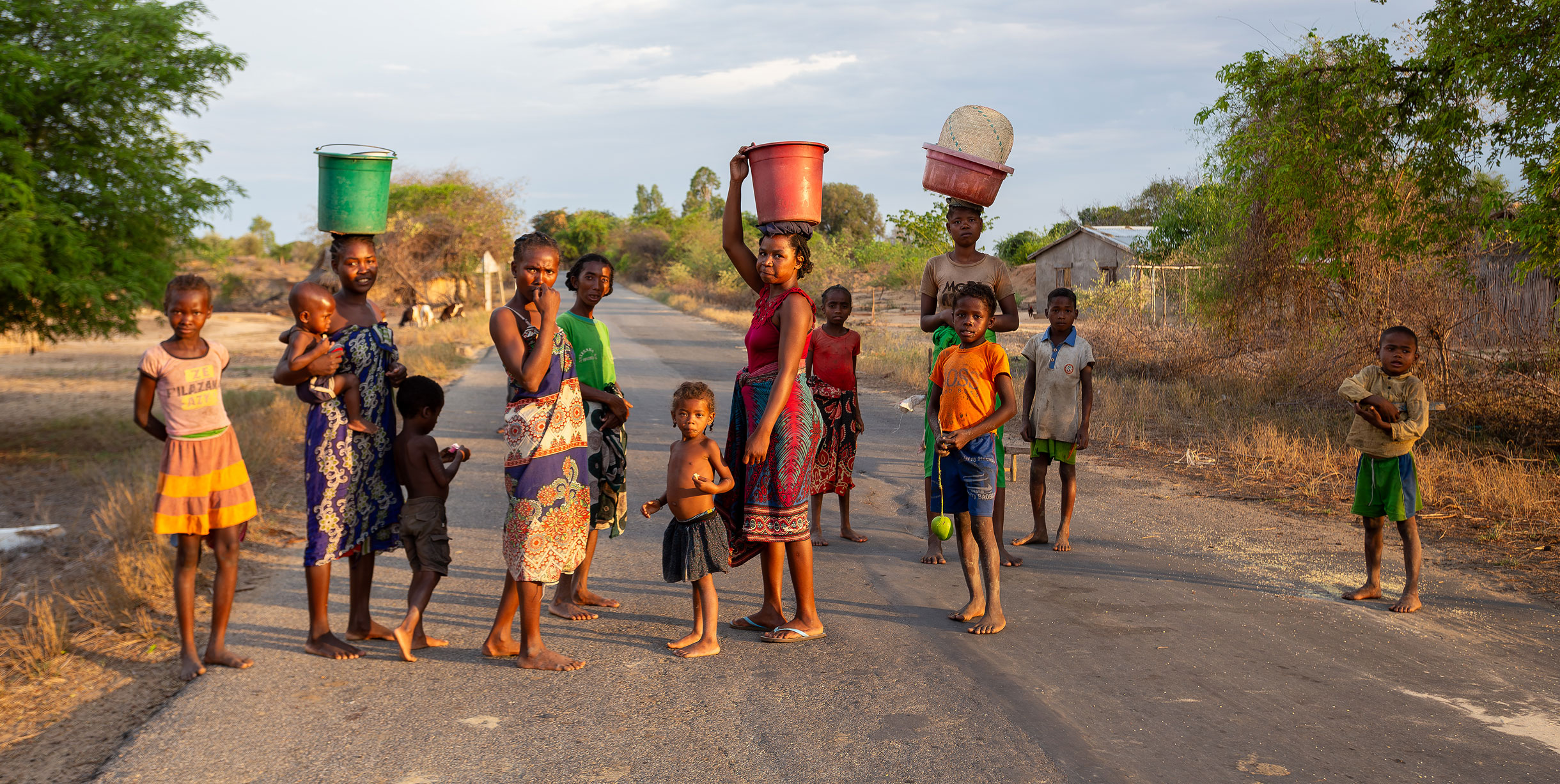
FIRST-PRIZE WINNER 2024 IWSH SCHOLARSHIP ESSAY COMPETITION
AVA HARTMAN
NORTH CAROLINA STATE UNIVERSITY, RALEIGH, NORTH CAROLINA
Felisca, a 6-year-old girl in Madagascar, watches her mom travel for hours on foot to a nearby well to bring water home to her family. Her mom arrives home at the end of the day with a gallon of water for the family to share. As this water is poured into a cup for drinking, the water is visibly discolored with particles floating on the surface. Felisca proceeds to drink the whole cup, knowing this might be the only water she will drink all day. However, this dirty water is the sole reason for the downfall of Felisca’s health. Water is a fundamental human right. It is the source of life for all living things. However, this basic human right is not easily attainable for more than one-third of the world (World Health Organization). In many parts of the world, water, specifically clean water, is scarce. Without access to clean drinking water, detrimental health effects can occur. Through my experiences abroad, I have developed a passion to help address the inaccessibility of clean drinking water around the world.
I first discovered the detrimental issue of the lack of access to clean drinking water and sanitation while volunteering in Madagascar on an Operation Smile surgical program. I spent two weeks there, and they were undoubtedly the best two weeks of my life. I fell in love with the kindness and passions of the volunteer team, the high and happy spirits that filled the hospital and patient village, the explosive smiles of the parents after watching their baby’s smile transform, and most importantly, the love, openness, and fun spirit of every patient. These kids had a spirit that felt like I had known them for my entire life. They lined the entrance to the patient village waiting for our arrival and never left our sides for the entire day.
While playing with these kids, I noticed many of them were extremely malnourished and looked much younger than their chronological age. After performing research on the causes of stunted growth in children under the age of 5, I found the main cause to be a general lack of sanitation and lack of access to clean drinking water. Driving around the island of Madagascar, I started to notice young kids filling water jugs with water from ponds covered in trash with visible discoloration. I noticed mothers walking barefoot carrying large jugs of water on their shoulders. And once again, I noticed small, malnourished children sitting on the streets. However, these dirty water sources and hour-long walks to get water were a regular occurrence for them. These kids do not know that the water they are drinking is the main reason for their constant stomach viruses, malnutrition, and physical stunting. They are completely unaware that this should not be their norm.
The final moment that fueled my passion and motivated me to address the lack of sanitation and clean water was when I looked across the street from our hotel on one of the first days of our trip. My eye was pulled to a man on the street who looked like he was kissing the ground. After looking a little closer, I noticed that this man was putting his mouth into a crack in the road to drink water that was contaminated with raw sewage. This image was shocking. Have I ever been so thirsty that I would resort to drinking sewer water on the streets?
No human should ever have to face this hardship. Water is a fundamental human right and should be available to all human beings, regardless of where they live. On my flight home from Madagascar, I knew I needed to address this issue. I began to research the causes of dirty water immediately. I discovered that one of the main causes of water pollution in these underprivileged areas was open defecation, inadequate access to functioning sanitation systems, faulty storage of solid waste and improper wastewater disposal (USAID). Consequently, fecal contamination of groundwater results in the widespread infestation of cholera and other pathogens. Therefore, it can be concluded that the contaminated water and sanitation crises in these areas work hand-in-hand.
I decided I needed to take action. I feel like even the smallest amount of help can make a huge difference in the lives of people struggling in these communities. My senior research paper was already bringing light to the ramifications around the lack of access to clean drinking water, but how could I use this to create some positive change? In March 2024, I held a mother-daughter-grandmother art auction event to raise funds for Waves4Water water filtration systems, and with generous donations exceeding $4,300, I will be bringing 120 water filters to our surgical program in September in Madagascar, where I will be living for 10 weeks. These water filters will provide every family we take care of with access to clean water. With education and village visits for follow-up, I will empower these families by the notion that if kept clean and cared for, each filter can provide upwards of 100 people access to clean water for five years. If I do my job, 12,000 Malagasy citizens may have a life of better health and a better perspective on their power to change the ecosystem in their communities.
In summary, the discrepancy between developed countries such as the United States and underdeveloped countries such as Madagascar is astonishing. We citizens of the United States constantly waste water without a second thought as to how fortunate we really are. On the other hand, the other 33% of the world struggles to find a single glass of clean water for their families and struggle daily with this problem (World Health Organization). Water and sanitation are inalienable human rights because no human being can live without them. Access to clean water and sanitation prevents illnesses, improves health, and ultimately, saves lives.

FIRST-PRIZE WINNER 2024 IWSH SCHOLARSHIP ESSAY COMPETITION
AVA HARTMAN
NORTH CAROLINA STATE UNIVERSITY
RALEIGH, NORTH CAROLINA
ESSAY COMPETITION
Fifteen years ago, IAPMO’s board of directors recognized how important it is to encourage the next generation to become active in our industry. In this industry are engineers who design the system, those who install and maintain it, others who manufacture products within that system, and those who inspect it. Although there are tried and true ways of doing this, innovation plays an important part in making sure new technologies and ideas are considered.
Introducing students to our important work is vital, and the essay competition is just one way IWSH is doing this. It’s been through the essay scholarship competition that students around the world have learned about IWSH and shared their innovative ideas with IAPMO and the foundation.
The IWSH Essay Competition was administered for its 14th year in 2024 and continues to gain exposure globally, inviting entries from students worldwide. Using a numerical scoring method, the essay committee members identified a first-place winner and three runners up.
This year’s question asked students: “Why do you believe access to water and sanitation is a human right?”
We look forward to your being able to read the winners in this and upcoming issues of Official.
The three writers selected — three $1,000 runners up and $2,000 first-place winner — are:
- First Place: Ava Hartman, North Carolina State University
- Runners-Up: Stella Wang, Markville Secondary School, Ontario, Canada; Samantha Eberl, University of British Columbia, Kelowna, B.C., Canada; Hannah Gilmore, Southern Baptist Theological Seminary, Louisville. Marc-Anthony Dorestan, Millersville University of Pennsylvania; Aleksander Penkov, Hannibal-La Grange University, Bulgaria; Seanna Kryger, George Brown College, Toronto, Ontario, Canada
Each of the winning essays will be published in Official magazine over several issues this year. Congratulations to all of our winners!
IAPMO wishes to thank everybody who submitted an entry and raised the level of this competition to something truly exceptional.
The Topic for the 2025 IWSH Essay Competition is:
“Why should private sector companies invest in improved water and sanitation access?”
The competition is open to any student actively enrolled in a high school, community college, trade school, four-year accredited college or university or working in an apprentice program.
Submitted essays must be the completely original work of the submitter and a minimum of 1,000 words. The essay entry deadline is 11:59 p.m. on April 30, via email, fax or mail to IAPMO World Headquarters. The winning essay will be announced in September at the 2025 IAPMO Education and Business Conference in Palm Springs. The author of the essay awarded first prize will receive a $2,000 scholarship and a one-year paid membership to IAPMO.
Second- and third-place winners will receive a $1,000 scholarship. All winning essays will also be published in Official, IAPMO’s membership magazine.
Individuals who meet the qualifications to submit an essay to the competition should include your name and your school’s or education/training organization’s name. All essays should be sent to Ms. Gabriella Davis at IAPMO by email at essay@iwsh.org; by fax at (909) 472-4222; or by standard mail to her attention at IAPMO, 4755 E. Philadelphia St., Ontario, CA 91761.
Last modified: April 8, 2025
